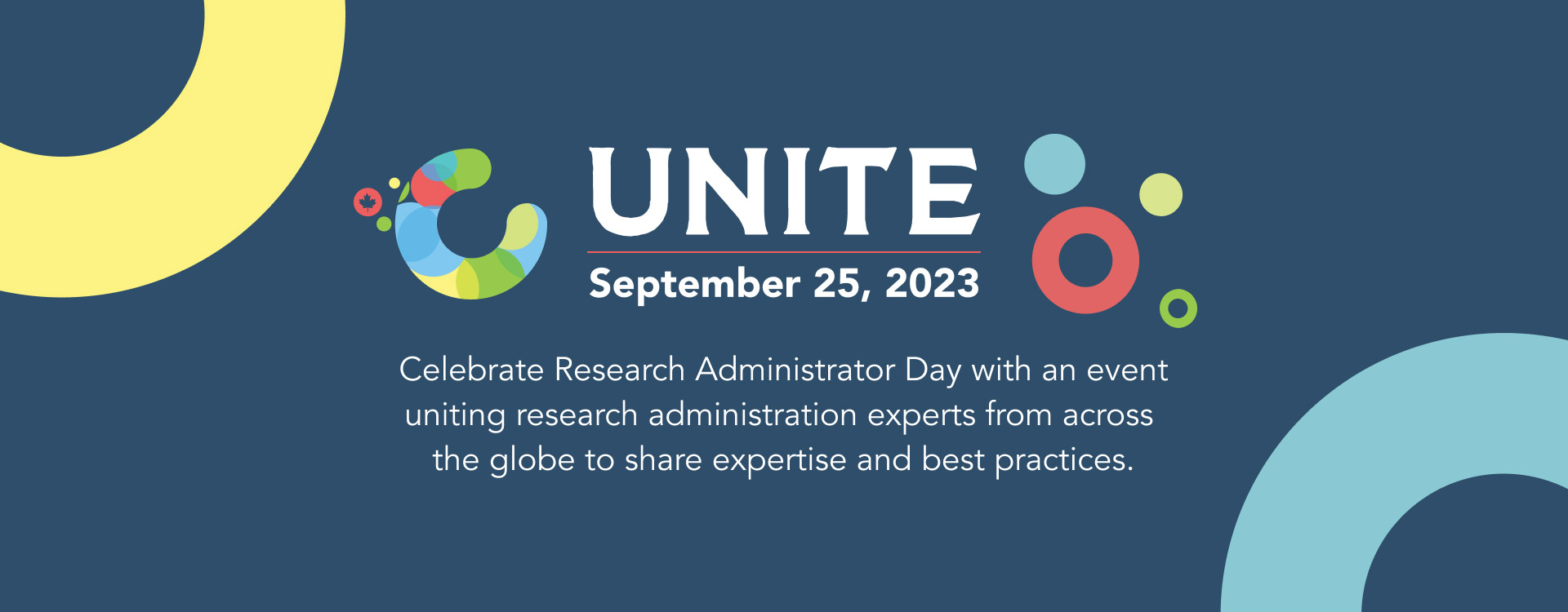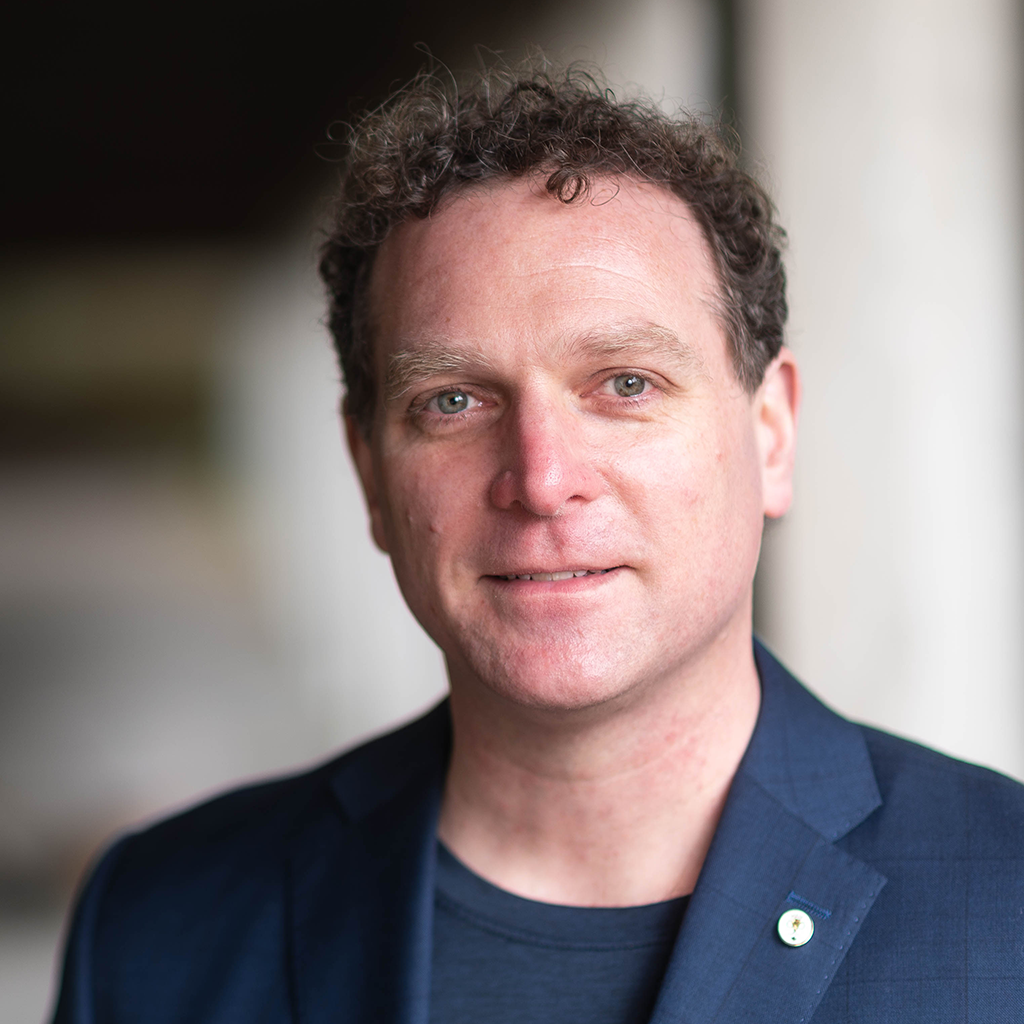
Abstract submissions for UNITE
Abstract submissions for UNITE is now closed. Should you be interested in other speaking opportunities, please contact Sarah Lampson to discuss.

 September 25, 2023 10:00 am
September 25, 2023 10:00 am Melinda Fischer
Pre-Award Grants Manager,Clemson University
Simon Kerridge
Madhuri Dutta

Research administration as a profession (RAAAP) is evolving globally. Better understanding of the trends, diversity, breadth and differences within our profession can inform our practice.
In this session, you will learn how to access and analyze the three RAAAP datasets that are the results of international surveys (2016, 2019, and 2022) of research managers and administrators (RMAs).
RAAAP-1 has 2,691 responses from 64 countries RAAAP-2 elicited 4,324 responses from 74 countries, and this year (2022) RAAAP-3 had 5,076 from 66 countries. These included 243, 337, and 177, respectively, from Canada.
In this session, we will show you how to find, download, and analyze the data. You should be able to mimic our demonstration as we guide you through the process with some Excel based examples.
At the end of the session, you will have an insight into these rich datasets and be able to construct queries, and understand the limitations of the data in order that your analyses are robust. You will then have access to a vast array of data and analyses that can give you an evidence base for your decision-making in a variety of research management scenarios.
Whether you are just interested in the profession or looking for evidence to help build your research management capacity, there is something in this session for you.
 September 25, 2023 10:00 am
September 25, 2023 10:00 am Nengaswary Maniam
Head, Research and Knowledge Exchange,University of Nottingham Malaysia

Thinking globally, understanding and accepting localised needs, sharing leadership and life-long learning to refine the character are essentials for today’s management. Successful research environment requires joint effort by everyone in the organisation. This session provides key principles and good practices in the context of the research management ecosystem. It will help you navigate high-performance culture and enhances efficiency along with a sense of credibility in the team setting. An efficient team with a great direction can achieve the unachievable.
 September 25, 2023 10:00 am
September 25, 2023 10:00 am Ian Carter
Director,Carter Research Navigation

Managing research includes matters relating to governance (duties), ethics (principles), and integrity (virtues). For research and innovation managers and administrators (RIMAs), we can extend this to include professional ethics and integrity. All of these contribute to and reflect the cultures and behaviours of our organisation and the wider sector. How do we manage to act with integrity in the context of supporting researchers with their research or knowledge exchange activities, in implementing institutional strategies, policies and procedures, or in interacting with external partners, funders and clients? This session will explore the competing tensions acting on individuals and RIMAs collectively, using examples from operational support and line management to organisational strategies and institutional culture.
 September 25, 2023 11:00 am
September 25, 2023 11:00 am Mickel Allen
Research and Administrative Support Assistant,York University
Julie Ann Grant
Director (Interim), Mona Office for Research and Innovation The University of the West Indies, Mona

The role of research administrators in facilitating and enabling knowledge mobilization in research and innovation.
 September 25, 2023 11:00 am
September 25, 2023 11:00 am Sapna Marwaha
Deputy Chair,Association of Research Managers and Administrators
Jennifer Johnson

In its report 'Complex Collaborations “ Efficiency, Equity, Quality and Security in International Research', ARMA found that whilst the majority of research organisations have made progress in responding to the Trusted Research and security agenda, there are unique challenges relating to the complexity and cross-cutting nature of the legislation which make this different to other forms of due diligence. The project also identified a need for immediate action that offers practical solutions to stakeholders at every level, in addition to longer term responses and cultural change. Working with international partners and stakeholders, we found commonalities in our experiences, and opportunities for knowledge sharing and cooperation.
 September 25, 2023 11:00 am
September 25, 2023 11:00 am Maria Pawlowska
International Partnerships and Open Science Lead,Visnea
Britta Baron

Canada is currently negotiating associated country status with the aim of partnering with Horizon Europe - the world's largest research and innovation program with a budget of 95.5 billion euros (CAD 140 billion). If, and when, this happens Canadian researchers and SMEs will gain access to a funding source, which provides financing on the order of millions of Euro per project and, additionally, access to a global network of innovators. A number of other countries have also recently expressed an interest in association. In our talk we will discuss the unique opportunities and challenges facing applicants and project participants from newly associated countries, in particular based on the Canadian experience.
 September 25, 2023 12:00 pm
September 25, 2023 12:00 pm Maya Collum
Project Manager,University of Toronto
Nick Anderson

"In our increasingly globalized world, there is a growing need for institutions to showcase their greatest assets: the expertise and experience of researchers and faculty. Not only can this increase the discoverability and impact of research, it can also open up new pathways for collaboration both in and off campus, and create new opportunities to explore industry and community partnerships. DiscoverResearch, launched in June 2023, is a new online public profile portal to highlight, celebrate and promote University of Toronto (U of T) experts across all disciplines. The tool connects U of T’s scholarly and research expertise with audiences like media, prospective graduate students, and academic collaborators, while simultaneously helping faculty keep track of the very important work they do. With automatic harvesting of trusted data from trusted sources (TSpace, PubMed, Web of Science, Scopus, internal grant management systems and more), DiscoverResearch offers a comprehensive view of a researcher’s outputs and scholarly activities. In this session, we will cover some of the new initiatives that U of T are embarking on to support and promote their researchers in new, innovative ways through DiscoverResearch. We will discuss best practices around how to communicate and engage users in new tools, as well as some of the functional and technical considerations to consider before launching a new institutional platform."
 September 25, 2023 12:00 pm
September 25, 2023 12:00 pm Gloria Greene
Assistant Vice President, Contracts and Grants,The University of Alabama in Huntsville

The most common question people ask is What is the essential thing I need to excel in my career? The universal answer: Communication. We cannot take our communication skills lightly. No matter where you sit, pre-award, post-award, IT, Compliance, and everywhere in between, you must know how to interact positively and proactively with people at all levels. This session will highlight the importance of good communication skills in the workplace and how to develop them.
 September 25, 2023 12:00 pm
September 25, 2023 12:00 pm Jocelyn Edwards
Interim Director, Grants Development & Research Administration,Lawson Health Research Institute

In this session you will learn to recognize common pitfalls in the research contracting process and how to avoid them. We will offer best practice tips and tricks for contract management and streamlining of processes with a view to supporting timely and efficient study start up.
 September 25, 2023 01:00 pm
September 25, 2023 01:00 pm Erica Conte
Director, Funding Strategy and Stewardship,INORMS Research Evaluation Group - Unity Health Toronto

Research assessment is a rapidly evolving field involving research administrators around the globe. The INORMS Research Evaluation Group (REG) has developed the SCOPE Framework as an implementation tool to conduct responsible research assessment. In addition, they have launched the More Than Our Rank initiative to work towards changing culture towards international rankings. This talk with describe this work of the INORMS REG and place it in the context of what is happening around the globe in this field.
 September 25, 2023 01:00 pm
September 25, 2023 01:00 pm David Phipps
Assistant VP Research Strategy & Impact,York University
Michael Johnny
Krista Elisabeth Jensen

KMb York and Research Impact Canada were founded in 2006. This session will provide an overview of knowledge mobilization and then focus on two KMb tools: dissemination and partnerships. We will also present on MobilizeU, a national knowledge mobilization training program designed for researchers and those research administrators who support them.
 September 25, 2023 01:00 pm
September 25, 2023 01:00 pm Jacqueline Hochhausen
Director, Research Accounting,University of Calgary
Daniel Morin
RPA Manager; Sheilla Dagta, Associate Director, Research Accounting

Describe Research Accounting's uses of Robotics Process Automation on: journal entries, project open and closure, compliance and report generation.
 September 25, 2023 02:00 pm
September 25, 2023 02:00 pm
Tricia L. Callahan

Personal branding is all about authenticity. Your personal brand is based in what is real, true and genuine. Anne Morrow Lindbergh once said “the most exhausting thing you can be is inauthentic.” Great advice when you are building your personal brand. Personal branding is permission to be you. An image is created in the minds of people when they hear a name or see a product or logo. A Personal Brand is the public perception of a person’s personality, skills or values. Rather than expecting our workplace organization to assist us in career development, we have to take proactive steps on our own. The session will explore why personal branding matters and will provide successful branding elements.
 September 25, 2023 02:00 pm
September 25, 2023 02:00 pm Karen Eck
Assistant Vice President for Research,Old Dominion University
Gretchen Kiser
Executive Director, Research Development Office, University of California San Francisco

Research organizations worldwide have increased investment in Research Development (RD) expertise as a part of the Research and Innovation Management (RIM) landscape. Rising demand for competitive proposal development, enhancement of collaboration and team science, and strategic research advancement created a need for both individual upskilling, mentorship and institutional capacity building. A major focus will be to engage participants in thinking about how to adapt strategies and programs to enhance individual professional development as well as catalyze collaborations, partnership and emerging research efforts at their institutions.
 September 25, 2023 02:00 pm
September 25, 2023 02:00 pm James Shelley
Knowledge Mobilization Specialist, Western University

Almost one year on from the public release of ChatGPT by OpenAI in November 2022, this interactive session will analyze the state of play of Generative AI in research administration. We'll delve into the current, prototypical, and hypothetical uses of new technologies, highlighting the integration of AI and automation in daily operations, data management, and decision-making processes. This presentation aims to provide an overview of the changes underway and a forward-looking perspective on the emerging areas of overlap of research administration, automation, and AI.
 September 25, 2023 02:00 pm
September 25, 2023 02:00 pm Mark Lucas
Chief Administrative Officer, David Geffen School of Medicine,University of California, Los Angeles
Terry Campbell
Asst Vice-President, Research Services, University of Ottawa,

"Research leaders understand that employee engagement is a key factor in an individual’s performance and in the creation of top performing teams, but it’s not always evident how to foster the type of environment where employees feel comfortable and where they can make meaningful contributions to their work. How does a leader achieve this “engagement magic, where the stars of personal fulfillment and team performance align? This session is an international case study from two research-intensive organizations, in the U.S. and Canada, which describes their experiences with employee engagement and the impact of these activities on strengthened team performance. The session will provide an overview of employee engagement practices and tools that can be used to strengthen engagement and promote inclusive work environments. Participants will be provided an opportunity to consider the applicability of these tools to their settings and to share their own experiences with employee engagement and moments of engagement magic. Learning Objectives: To define employee engagement and its importance for creating top performing teams To present tools and practices that leaders can use to strengthen employee engagement and to promote a dialogue on leadership practices and experiences "
 September 25, 2023 03:00 pm
September 25, 2023 03:00 pm David Phipps
Assistant VP Research Strategy & Impact,York University
Jaylene Wehipeihana

There are no established "best practices" for supporting Indigenous research but practices are emerging in Canada and in New Zealand. David Phipps (York University) and Jaylene Wehipeihana (Universities New Zealand) will reflect on their experiences and reflect on similarities and differences supporting Indigenous research on Turtle Island and in MÄori contexts.
 September 25, 2023 03:00 pm
September 25, 2023 03:00 pm
Scott Baker
Manager, Sensitive Research,University of British Columbia

"They say the only constant is change. That certainly holds true in the realm of research security. Both from the threats facing it through to the responses to those threats. Start with a combination of new funder requirements, legislation, institutional policy and the needs of research teams. Top it off with a sprinkling of large language model generated malware, a pinch of global unrest and a dusting of pandemic residue. Don't Panic! Join this ever so slightly tongue in cheek session that routes through the realms of Risk, RDM, and research requirements to propose practical plans, possible procedures, and parades potential paths promising peace and productivity!"
 September 25, 2023 03:00 pm
September 25, 2023 03:00 pm Wade Kelly
Director, Research Excellence and Impact,Monash University

Dr Kelly will discuss the Monash University approach to embedding impactful approaches into the fabric of the university's research culture. Monash University is a top 50 global university with eight campuses across five countries, 18k staff and 85k students. Mobilising a massive high-performing university to meet the challenges of the age is critical. In the session, Wade will discuss the suite of programs and initiatives he spearheads that are both top-down and bottom-up in orientation. The stakeholders represented include researchers across all career stages (including PhD students), research leadership, and research professionals. For cultural change to occur, impact has to be integrated into the fabric of how the university operates and what the university stands for. The approach innovatively clarifies to stakeholders how the activities within the impact portfolio align with the goals of the institutional plan to progress organisational culture.